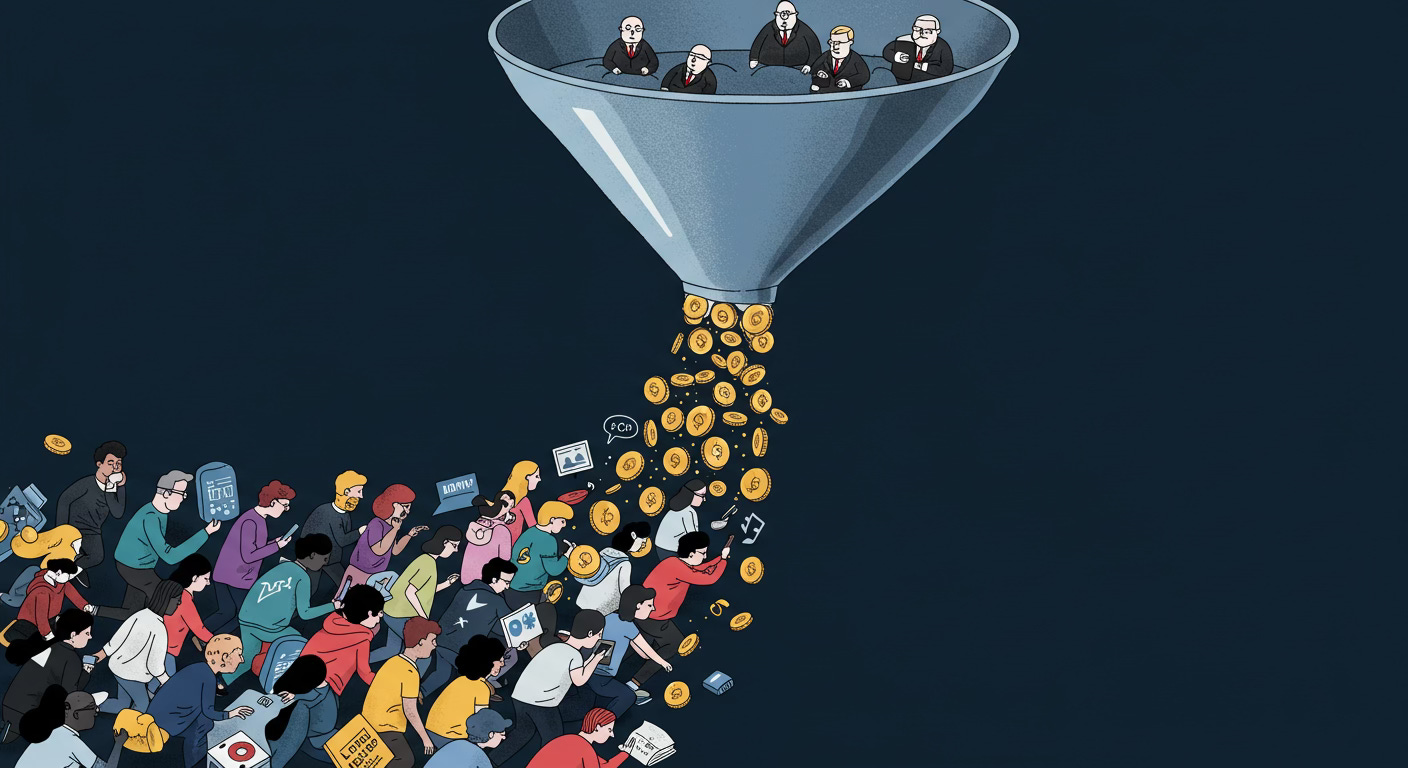Enshittification 💩 Why the internet stinks now
From platform to parasite: How big tech turned against its users
At the end of 2024, ‘enshittification’ was crowned Word of the Year by the Macquarie Dictionary, a signal that even lexicographers have noticed what millions already feel: online platforms are systematically getting worse for everyone except those at the top.
If you’ve noticed Google’s results clogged with junk, Instagram showing only ads and celebrity reels, Uber costing as much as a black cab, or Amazon’s ‘bargains’ buried under sponsored clones, you’re seeing it in action.
The term, coined by writer and activist Cory Doctorow, describes the process by which digital platforms (Google, Meta, Amazon, Uber) and increasingly the AI tools meant to “fix” them, lure us in, then milk us dry.
Platforms start off great, then gradually squeeze users, creators, and suppliers for every last penny, shifting all value up the chain to shareholders. Monopoly, network effects, and moats just speed up the cycle.
I’ve lived through the best and worst of digital media. My early career thrived in that golden era when nimble online upstarts could dethrone print dinosaurs and slow-moving incumbents, riding a wave of open access and low-cost distribution. But then the monopolies dug in. Once Google and Meta seized control of the pipes and ad markets, the chokehold was on and the spark that made the internet exciting started to die.
That’s why I’ve devoured both of Cory Doctorow’s books, Chokepoint Capitalism and The Internet Con, and followed his blog for years, chasing every rant and research drop. What stands out isn’t just his flair for spotting platform rot, but the real consequences for founders and builders like us. It’s personal: if you’re building anything online, the lessons here are about survival, not just theory.
Doctorow’s playbook is clear. Here’s how it plays out: 👇🏻
— Millennial Masters is sponsored by Jolt ⚡️ reliable hosting for modern builders
Google: From helpful search to advertising machine
Google started as the world’s cleanest search box, promising “don’t be evil” and surfacing the web’s best answers. Fast-forward to now, and Google is the world’s largest ad company, cluttering every query with sponsored results, shopping carousels, and SEO-choked clickbait.
Want to buy a phone charger or check the news? Prepare to wade through a sea of adverts, promoted listings, and links to Google’s own products. Organic results are pushed further and further down, often below the fold. Amazon and eBay links dominate shopping searches because they’re the ones willing to pay the most to be there.
Google ad dominance, self-preferencing, and rigging its search algorithms to favour its own properties is not just annoying. For founders, discovery is now pay-to-play and SEO a mug’s game. Building a brand ‘on Google’ gets harder by the day.
The receipts: US antitrust regulators have now ruled Google a monopoly in not one, but three separate cases: digital advertising, search, and the Play Store. Most recently, a landmark court decision found Google’s dominance in digital advertising so overwhelming that Judge Leonie Brinkema flatly stated, “Google is a monopolist”.
Google now faces a forced breakup, splitting up the very empire that rewrote the rules of the internet and reshaped how information, commerce, and culture flow online.
Meta, Facebook, Instagram: Killing community for control
Remember when Facebook felt social? Now it’s a relentless feed of “suggested” posts, Reels you never asked for, and ever more invasive adverts. Instagram used to show friends’ photos; now it’s influencers, ads, and whatever the algorithm wants to push.
Meta’s playbook: lock-in users by making their social graph impossible to export, then steadily dial up the extraction. Organic reach for creators and businesses has collapsed; only paid promotion gets you seen.
Meta buys up or copies every threat: WhatsApp, Instagram, attempted TikTok clones, and builds network moats so high that leaving means losing your digital life.
Meta, too, is in the crosshairs. The US Federal Trade Commission and dozens of states have dragged Meta into a landmark antitrust trial, accusing the company of crushing competition and harming both users and advertisers by buying or copying rivals and locking people into its ecosystem.
As detailed by the “Big Tech on Trial” project, the case claims Meta has failed at the job it was “hired” to do: enable healthy competition and innovation in social media, instead using its dominance to stifle challengers and harvest ever more data for profit.
Amazon: The “everything store” that buries the best deal
Amazon’s public pitch is all about convenience and low prices. The reality? Amazon’s search is now an ad-saturated maze, with “sponsored” listings, Amazon’s own knock-offs, and paid placements everywhere you look.
Want the best deal or most ethical choice? Good luck. Amazon buries competitors under a pile of its own brands, squeezes third-party sellers for higher fees (now up to 40% of each sale), and copies bestsellers when it suits them.
Sellers risk being delisted or undercut at Amazon’s whim. Cheaper or better products are routinely hidden behind a wall of sponsored junk. What’s left is an online mall optimised for Amazon’s profit, not user choice or seller survival.
If you’ve ever sold a product on Amazon, you know the story. If you’re thinking about starting now, make sure you listen first to Cory Doctorow’s episode In God We Antitrust from his podcast Understood: Who Broke the Internet?
Uber: From disruptor to price-gouging giant
Uber’s big promise was cheap, reliable rides and a frictionless app. After burning billions to wipe out local cab firms, Uber now charges surge fares at will and sometimes prices rides higher for users with low phone battery, a predatory trick reported in multiple investigations.
Drivers are squeezed by constantly changing pay rates and opaque algorithms. Users are trapped too, as local options dwindle. Uber’s infamous playbook: use investor money to subsidise rides, then jack up prices and slash pay once competition is gone.
You don’t need to dig far to see platform power in full “crush mode.” If you hop in an Uber in London, you’ll notice the price isn’t dramatically cheaper than a black cab. But when Uber rolls into a new market, like my own small city of Lincoln, the playbook shifts. Suddenly, rides are half the price of regular taxis, as the company floods the market with drivers from neighbouring areas and, according to drivers I’ve spoken to, sometimes subsidises rides by up to 100%.
It’s a deliberate move to undercut local competition and gain market share at any cost. But the endgame is always the same: once rivals are squeezed out and drivers are hooked, fares creep up and incentives disappear. Everyone knows what comes next, except, perhaps, the newcomers still chasing the promise of convenience.
Apple: Darling of tech, master of the walled garden
Apple has spent decades burnishing its image as the customer-friendly, privacy-first underdog. But Doctorow’s receipts tell a different story: a tech giant that perfected the art of the walled garden, locking users and developers into an ecosystem designed to extract more with every iteration.
Doctorow’s definition of enshittification fits Apple like a glove. First, Apple delighted users with sleek hardware and a seamless experience. Then it reined in developers, restricting what they could build, how they could charge, and how users could pay.
Apple’s App Store rules force developers to pay a 15–30% commission, ban alternative payment methods, and threaten app bans for stepping out of line. For users, this means higher prices, less choice, and features getting yanked if they threaten Apple’s bottom line.
Doctorow also highlights Apple’s lock-in tactics: you can’t side-load apps on iOS (without jumping through risky loopholes), and once you’re inside Apple’s garden, moving your data, music, or even accessories elsewhere is needlessly difficult. All of this keeps users and developers trapped and dependent.
Apple too has faced antitrust lawsuits in the US and Europe, with regulators ordering it to open up its App Store and allow alternative payment methods. Yet Apple keeps dodging, finding technical and legal tricks to maintain control. Critics call this regulatory “malicious compliance” and Doctorow says it’s the playbook: “Every time a judge or regulator tries to pry open Apple’s walled garden, Apple just plants a new hedge.”
AI isn’t saving the internet yet
There’s a new pitch from Silicon Valley: generative AI will fix what’s broken. Reality check: AI isn’t making search, discovery, or commerce better for users. It’s mostly another tool for platforms to lock you in, auto-generate filler, and keep eyeballs glued to their ecosystem.
Doctorow argues that AI “hallucinates” as often as it helps, and that Google’s AI-powered search is designed to keep you within the walled garden, not to send you to the open web. Case in point: Ask ChatGPT for a web reference to a claim it made, and the resulting link will be likely broken or nonexistent.
AI is also used to enforce algorithmic control, push sponsored content, and make it harder for independent creators to break through. In other words: AI is enshittification at machine scale.
So, if you’re betting on AI to disrupt the gatekeepers, think again. So far, it’s made them even more powerful.
What this means for founders, creators, and operators
The real story of enshittification is what happens when giants stop competing for us and start extracting from us.
Because the new generation of platforms, OpenAI, TikTok, LinkedIn, Spotify, even Substack, are the next wave of enshittifiers.
Independence, audience ownership, and diversification are now existential. Platform dependence is a trap.
For the new wave of founders, creators, and business builders, the rules have changed. Building on someone else’s platform, whether it’s Google, Meta, Amazon, or even OpenAI, means you can have the rug pulled out from under you at any time.
The next generation of digital winners will be those who build direct connections, use open protocols, and avoid “single point of failure” platforms.
Can we fight back? Paths out of the chokepoint economy
Doctorow isn’t all doom. There’s a roadmap for making the internet less enshittified:
Interoperability and open protocols: Forcing platforms to open their APIs and make switching possible.
Antitrust action: Breaking up the worst offenders, stopping further consolidation, and restoring competition.
Radical transparency: Demanding clear algorithms, accountability for moderation and ranking, and genuine user control.
Adversarial interoperability: Enabling users and competitors to plug into closed systems, reversing the “walled garden” effect.
Collective action: Unions for creators, new cooperative models, and grassroots organisation to build alternatives.
Reclaiming the open web
Entshittification didn’t happen overnight, and it won’t be reversed by accident. The platforms that built the modern internet are now its biggest threat, slowly draining value from users, creators, and everyone who believed in the open web.
The next decade will decide whether the internet remains a rent-extracting wasteland for a handful of trillion-dollar firms, or if a new wave of founders, creators, and builders can wrest it back.
For anyone building in the digital age, the lesson is clear. Don’t put your future in the hands of platforms with every incentive to squeeze you dry. Own your relationships, prioritise open standards, and be ready to walk away when the enshittification begins.
The word of the year says it all. Don’t wait until your business, brand, or career gets the treatment too.





Damn I hadn't even heard of "enshittification" though experience it through and through. AI slop has made the internet and all of the "social" platforms so terrible. It's the wild wild west really. I just think it's a hard time to be a creator or business because of the noise and the enshittification by these platforms. But at the same time, the simple recipe is just being human and standing for something. That, when done consistently, could help you build and resonate deeply with your audience. Thanks for putting this together, Daniel.
The overzealousness of tech companies will continue in the AI age as well I feel, just in another form. The idea of a corporation is closely linked to this concept.